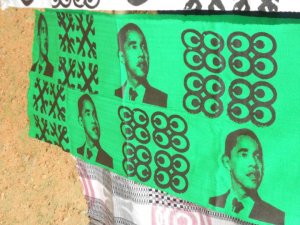I know this will be
controversial. I am from Spain, where there is also racism, and when
I saw a post titled “Racist Spain” I got mad and upset. It is
shocking our capacity to merge with concepts, such as our nation,
and feel so identify with it that we defend it from bad depictions we
hear (read) about it.
But here I am, about
to describe the racism I felt while living in Ghana, and in other
African countries as well. I know I will be criticized for it, but I
guess after reading other opinions and testimonies of racism,
homophobia… and other intolerances, I can also speak up about my
experience as a minority.
During my two months
in Ghana, one month in Kenya, one month in Ethiopia, and thirteen
months in Somalia, I felt treated differently. Some people would always
tell me that because I am white I cannot complain about racism.
Racism for many non-white people is the oppressive system that
doesn’t provide equal opportunities to its citizen based on their
skin color. Well, I agree with that perception of racism, but I also
feel that the minute you judge me and act towards me in a different
way because the color of my skin is different from yours, you are
being racist.
 |
| Obama cloth by Abby Line Berry. Source: https://abbylineberry.wordpress.com/2011/10/27/five-reasons-africa-got-my-goat-today/ |
Prejudices and
stereotypes play a big role in racism. In Africa, this is not
different. Being a white person turns you out into an ATM with legs,
in general terms. Although it is true, I assume genuinely, that most
of the white people in Ghana have more money that the average
Ghanaian, it is really frustrating and annoying that constantly
people approach you and call you out in the street to get some money
or influence from you. They are following a stereotype, but that
doesn’t mean it is right.
In the same way that is annoying, frustrating and racist that many black people feel judged as poor and ignorant in the white countries, I felt bad when in black countries locals don’t treat me as everyone else.
The thing that I most hated was that every time I got out I had to listen people calling me obruni (white man). Every time I wanted to shop, they raised the price five to ten times higher than to a local. Every time I was walking on the street taxis honked at me because they do not think a white man could feel like walking or taking a bus (trotro) like everyone else. Every time I went partying hookers came around becoming their main target. Children followed me, touched my skin, touched my hair, joked at me… I felt like: yes, my skin color is different, no need to remind me all the time.
In Ghana they call you obruni, in Kenya is mzungu, in Ethiopia is faranji, etc. It amazes how shameless people call you out these names to your face knowing that it only takes few days to understand you are referring to me by my race. They don’t use other physical feature, but your white skin color. I guess it is cultural but in the West it is very rude to call out someone by any physical feature unless it is a nickname that both agreed to use. One thing is to use a physical feature to describe someone and another is to be called obruni in the bus, in the market, at the street, by police, by taxis… It is just too much.
The good thing, if there is a good thing about racism, is that the racism here positioned you generally in a higher status than the locals. They think that because you are white you have money, education, and honesty. The police would never harass you or blame you as it happens in the West with black people. They won’t kick you out or refuse you from getting in any place. Students and teachers would respect you, and your opinion in discussions would matter. It can get to your head if you don’t watch carefully.
To sum up, being a white person in Ghana, and so far in the African countries I have been, would always be a problem to act naturally. Even if you are black from the West, they would not treat you like them. Most of the people, the uneducated, will always treat you different because you are a Western, but specially if you are white and female. They will think you are naive and generous, and that you don’t lack resources or support. They will try to get benefits from you such as money, influence, or popularity (how many random people asked for a picture in the street, I can’t remember). It is sad, but it is a reality. Some white folks I met who have lived there for years became kind of arrogant and distant with the locals because of these daily attitude towards them. To worsen thing, some tourists promote these kind of racism when they approve being called obruni, accept to be shot pictures randomly in the street, or pay more money than the average Ghanaian for the same products/services.
*Racial discrimination- treatment or consideration of or making a distinction in favor of or against a person based on the racial group to which the person is perceived to belong rather than individual attribute.



